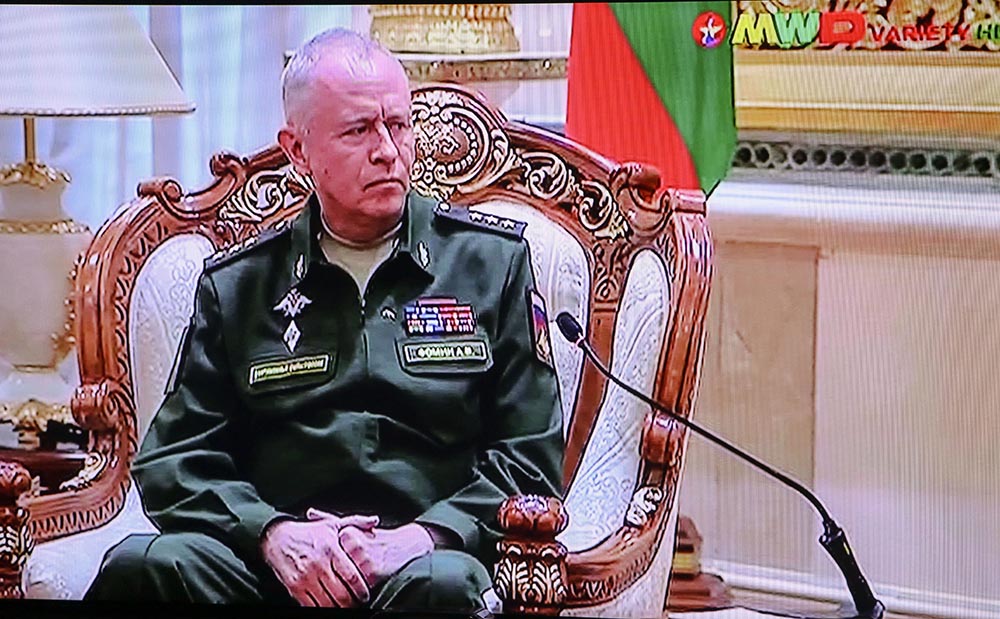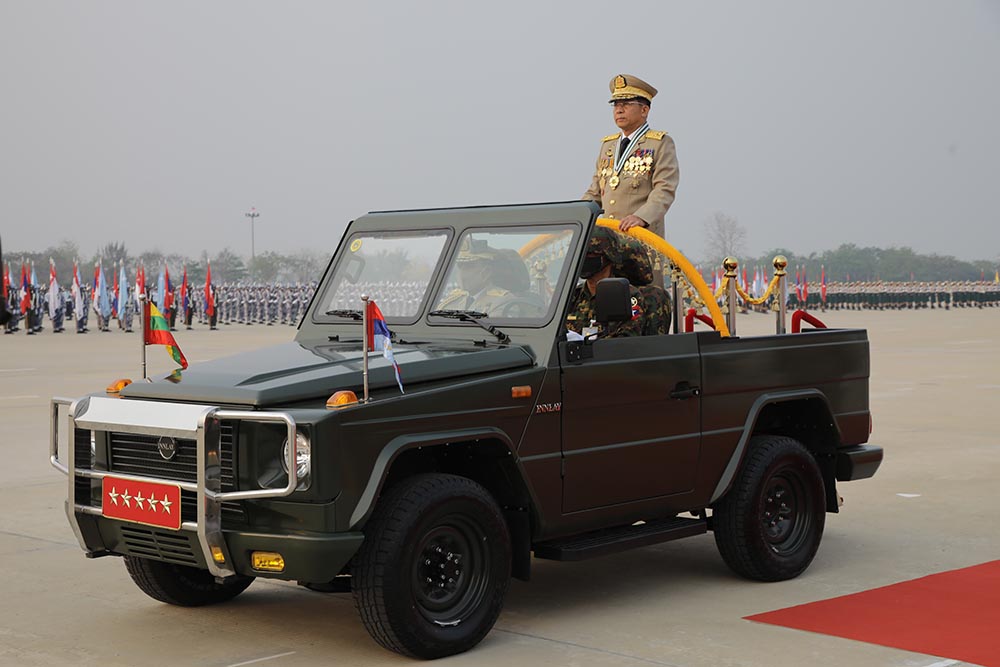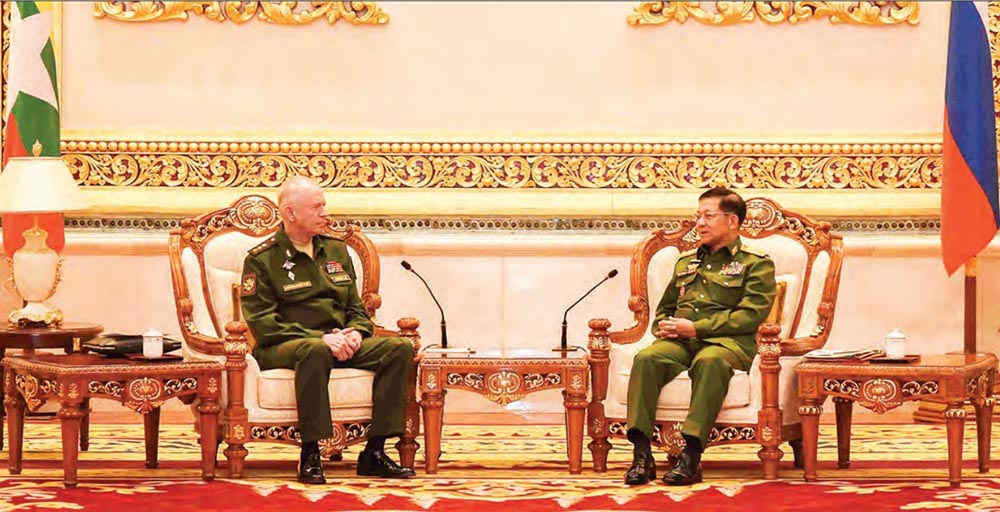Defying calls to isolate the Myanmar junta internationally, Russian Deputy Defense Minister Alexander Fomin was in conspicuous attendance at the Myanmar military’s celebration of Armed Forces Day on March 27, prompting Senior General Min Aung Hlaing, coup maker and self-appointed national leader, to express “profound gratitude” for Russia’s vote of confidence. He went on to “impart that the Russian government and responsible persons from the Russian armed forces are acknowledged and inscribed for their substantial support to the Tatmadaw [Myanmar’s military] in a friendly manner, though we are far apart.”
In his speech, the senior general also declared that the military “seeks to join hands with the entire nation to safeguard democracy” and promised to hold elections. Even as he read the words, his junta’s forces were in the process of killing more than 100 unarmed protesters throughout the country, ensuring that the day would be remembered not just as Armed Forces Day, but as the bloodiest so far in the ongoing crackdown on resistance to the military regime.
Foreign diplomats based in Yangon have portrayed the situation in Myanmar as one of a besieged people defending themselves, and where possible fighting back, against an occupying force. Meanwhile in Naypyitaw, the image being projected was one of fraternal solidarity among military men, with Moscow’s delegation, and its endorsement of the regime, met with smiles all around and the pinning on Fomin of a medal by Snr-Gen Min Aung Hlaing in a meeting room filled with uniformed figures. Apart from Fomin, the Russian delegation included Pavel Gusev, an adviser to Russian President Vladimir Putin and chair of the Presidential Council for Civil Society; along with the head of the Moscow Buddhist Society; senior Russian military officers and civilian officials; and members of the Russian media.
Russia’s substantial support to the regime, and the friendly manner in which it has been extended, has been noted and will be remembered. In contrast, the chiefs of defense of Australia, Canada, Germany, Greece, Italy, Japan, Denmark, the Netherlands, New Zealand, South Korea, the UK and the US released a joint statement condemning the Myanmar military for its use of violence against its own citizens across the country.

“As Chiefs of Defense, we condemn the use of lethal force against unarmed people by the Myanmar Armed Forces and associated security services,” the statement reads. “A professional military follows international standards for conduct and is responsible for protecting—not harming—the people it serves.
Defense attachés in neighboring countries including Vietnam, Laos, China, India and Thailand sent observers to attend the Armed Forces Day parade. (Their attendance brought back memories of 1988, when Thailand was the one to break Myanmar’s isolation after General Saw Maung staged a bloody coup on Sept. 18. On Dec. 14, almost three months after the coup, then Thai army chief General Chavalit Yongchaiyudh paid a high-level visit. He addressed Gen. Saw Maung as “akogyi”—“big brother” in Burmese—during a dinner reception in Yangon. Gen. Saw Maung reciprocated by declaring Thailand a “true friend” of Myanmar. In return, Bangkok received lucrative logging contracts, fishing rights and sweet deals in the hotel business. Chavalit also agreed to repatriate student activists who had fled to Thailand after the crackdown.)
In the current context, with Myanmar sliding further into chaos each day—and the discussion even turning to long-term fears of civil war or the possibility that the country will become a failed state—Fomin’s visit has ominous implications
Globally, wherever there is conflict, Russia is sure to rear its head. With Myanmar having suddenly emerged as a hotspot, it’s hardly surprising it has attracted the attention of the Kremlin leadership.
A Western diplomat who served in Myanmar from 2012 to 2016 commented, “Russia doesn’t care [about Myanmar’s stability or its people] as long as it can continue to sell weapons.”
For his part, Fomin said during his visit that Russia in fact sought to strengthen military ties with Myanmar. Russia’s Defense Ministry said in a statement published by Interfax, a Russian newswire, that “the parties positively assessed their rapidly developing mutually beneficial relations in the military sphere and reaffirmed their intention to make the most of the existing potential in order to deepen military and military-technical co-operation in the spirit of strategic partnership,” according to The Financial Times.
One Western diplomat said: “I am afraid he [Snr-Gen Min Aung Hlaing] and his crew are viewing the situation like [Syrian leader Bashar al-] Assad—open to destroying the country to protect themselves at this point. In way over their heads and only know one way to go; to protect their egos and themselves.
This inevitably raises concerns that rival powers including China, India, Japan and the US will be drawn into the crisis in Myanmar.
Faced with growing international pressure and Western sanctions, the junta needs legitimacy and backing from powerful countries such as Russia and China.
Beijing cannot have failed to take notice of the very public embrace by Snr-Gen Min Aung Hlaing—who has in the past expressed veiled reservations about China’s dealings with Myanmar—of deeper military-to-military ties with Russia.
Valued client
Myanmar is a long-time buyer of Russian arms, and participated in a joint drill with the country last year. Russian naval ships have made several port calls to Myanmar.

Since the early 2000s, Myanmar has bought 30 Russian-made MiG-29 jet fighters, 12 Yak-130 jet trainers, 10 Mi-24 and Mi-35P helicopters, and eight Pechora-2M anti-aircraft missile systems. It has also signed a contract to purchase six Su-30 warplanes. Maintenance of the Russian-made equipment is carried out at a joint service center in Myanmar.
Malaysia, Vietnam, Indonesia and India have purchased Su-30s, and Myanmar is expected to take delivery of its first batch of the multirole combat aircraft soon.
According to Stockholm International Peace Research Institute data for 2019, Myanmar spent an estimated US$807 million on Russian arms imports over the previous decade, making it the second-largest Southeast Asian buyer of Russian weapons after Vietnam.
From 2001 to 2016, Russia accounted for the largest share of Myanmar’s military hardware spending, with the total value of its acquisitions from the country ($1.45 billion) outpacing those from China ($1.42 billion) during the period, records show.
Additionally, Myanmar annually sends officers to Russian military academies for training. So far thousands of military students have graduated from prestigious universities in Russia and some have received postgraduate and doctoral degrees. (Myanmar’s military also sends officers to India, China, Japan and Israel.)
Myanmar also sends more citizens and military cadets to study under scholarship programs in Russia than any other Southeast Asian country except for Vietnam.
Vyacheslav Tseluyko, an expert on the Russian military, once commented that Myanmar was a potential springboard into Southeast Asian and neighboring arms markets those of including Laos, Indonesia and even Bangladesh. Therefore, Myanmar is a strategic market entry point for Russia.
Eve-of-coup visit
Before Fomin’s visit, and 10 days before the Feb. 1 coup, Snr-Gen Min Aung Hlaing received Russian Defense Minister General Sergey Shoigu in Naypyitaw on Jan. 21.

The commander-in-chief thanked Russia’s long-serving defense minister for the visit. “Just like a loyal friend, Russia has always supported Myanmar in difficult moments, especially in the last four years,” he was quoted as saying by Russian media.
In Naypyitaw, security was unusually tight during the visit. The Russian delegation arrived in two planes and occupied the opulent five-star Kempinski Hotel. During the visit, Myanmar and Russia agreed that Russia will supply Myanmar with Pantsir-S1 surface-to-air missile systems, Orlan-10E surveillance drones, and radar equipment.
Military sources said military leaders in Myanmar made a special effort to receive Shoigu with full honors.
“We view today’s talks as an opportunity to further our cooperation, especially in the military field,” Shoigu said as he met with Snr-Gen Min Aung Hlaing.
During their meeting he said Moscow was ready to further deepen relations between the defense departments of the two countries and to develop cooperation in the military-technical sphere.
The visit cemented Shoigu’s already close relationship with Snr-Gen Min Aung Hlaing, who has visited Russia six times. Several diplomats and observers have since concluded that Russia had advance knowledge of the coup and endorsed it.
Political ambitions
Speaking to Russian media during his visit to Moscow in June last year, five months ahead of November’s general election, Snr-Gen Min Aung Hlaing hinted at his desire to enter politics, though he gave no indication that a coup would be his route to achieving that goal.

The senior general was there to attend the 75th annual Russian Victory Day, which commemorates the defeat of Nazi Germany in 1945 at the end of World War II.
In an interview with Russian media outlet Arguments and Facts, when asked about his “role in the upcoming general elections”, he said his first priority, as in previous general elections, was to help ensure that a free and fair vote was held. Once the election result was known, he said, he would continue to work based on the wishes of the political parties, other groups and the public, according to a Burmese-language transcript of the interview posted on his website.
The military chief said he had 40 years of experience in political, military and administrative affairs. He said that during this period he had served the nation and the people, adding that he would continue to serve in whatever role was needed.
“I believe that those experiences will be valuable in serving the nation and the public,” he said.
Russia’s embrace
Russia and Myanmar established ties in 1948, and three years later opened embassies in each other’s countries. Along with China, Russia voted to block a UN Security Council resolution criticizing Myanmar over the Rohingya crisis in 2017. After the coup last month, Moscow joined China in backing the junta at the Security Council. As it has in the past, Russia will likely veto any UN attempt to impose an arms embargo in the future.
Myanmar is not a close neighbor of Russia; Moscow’s interest in Myanmar is selling military hardware, and possibly countering Western influence, rather than any pressing geostrategic imperative. With its fondness for expending resources in distant conflict zones, it will always need hard cash.
But if Myanmar becomes a failed state, it is China, India, Thailand and other neighboring countries that will suffer, not Russia. Indeed, whether Russia’s support for Snr-Gen Min Aung Hlaing and his junta is enough to keep it in power remains to be seen. But where is China—Myanmar’s supposed ally—in all of this?
On Feb. 17, Chen Hai, the Chinese ambassador to Myanmar, said the current situation in the country is “absolutely not what China wants to see,” amid growing anger toward Beijing among Myanmar people due to its perceived support for the military regime.
On March 8, China issued a three-point statement: First, it said it hoped all parties in Myanmar would keep calm and exercise restraint, address their differences through dialogue and consultation within the constitutional and legal framework, and continue to advance the democratic transition. The immediate priority is to prevent further bloodshed and conflict, and ease and cool down the situation as soon as possible, he said at a press conference on the sidelines of China’s annual legislative session. Since then, however, Myanmar has only seen more bloodshed.
Second, he said, China supports ASEAN in upholding the principles of non-interference in internal affairs and making decisions through consensus, mediating in the “ASEAN way” and seeking common ground. On the basis of respecting Myanmar’s sovereignty and the will of its people, China stands ready to engage and communicate with all relevant parties, and play a constructive role in easing the tensions in Myanmar, Wang said.
Nevertheless, feeble ASEAN has no leverage or authority to solve Myanmar’s crisis. In fact, China is the one major country that could send a loud and clear message to Naypyitaw.
Making his third point, Wang said that as China and Myanmar have a shared future, China would not waver in its commitment to advancing China-Myanmar relations, and would not deviate from the course of promoting friendship and cooperation, no matter how the situation evolves.
“Over the years, we have maintained friendly exchanges with various political parties in Myanmar, including the National League for Democracy,” Wang said.
This is not the unambiguous message the generals hoped to hear.
By extracting Russia’s endorsement, Snr-Gen Min Aung Hlaing has not only sent a chilling message both to Myanmar’s citizens and the international community, but also furthered his aim of playing the major powers off each other in order to gain the maximum benefit for his regime.
You may also like these stories:
Myanmar’s Striking Civil Servants Nominated for Nobel Peace Prize
US and UK Sanction Myanmar Military-Owned Conglomerates
World Bank Forecasts 10 Percent Slump in Myanmar’s Growth
















